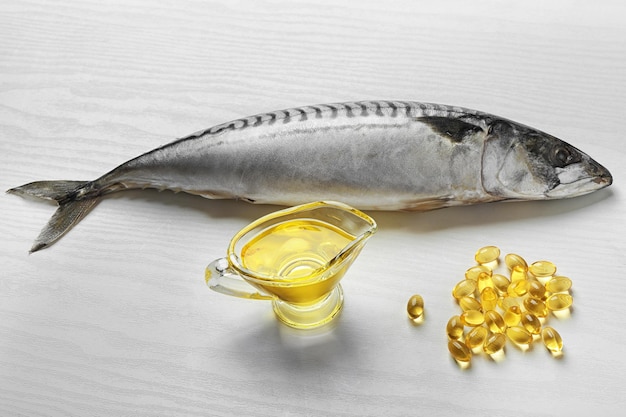What Is Fish Oil?
Fish oil is derived from fatty fish like sardines, anchovies, and mackerel. Once caught, these fish are transported to a factory where they are ground up and steam-cooked. A centrifuge then separates the meat from the oil. The oil is purified to remove impurities, and antioxidants are added to it. Therefore, the fish oil you get is not typically just pure fish oil.
Traditional Sources of Fish Oil
Some common sources of fish oil include:
Sardines, Mackerel, Herring, Anchovies, Black cod, Salmon
Why Do People Take Fish Oil?
People consume fish oil because it contains omega-3 fatty acids, which are believed to offer numerous health benefits. Fish oil primarily contains docosahexaenoic acid (DHA) and eicosapentaenoic acid (EPA), with some alpha-linolenic acid (ALA). Different fish oil products have varying ratios of DHA to EPA, and scientists are still exploring their specific roles in health benefits, which range from eye health to mental wellness and cardiovascular support.
Recent studies suggest that DHA plays a more significant role in these benefits. Alternatives like microalgae oil may offer more favorable ratios of DHA to EPA, meaning more DHA and less EPA.
Is Fish Oil Bad For You?
Despite the benefits of omega-3 fatty acids, there are concerns about fish oil. It doesn’t fit into a plant-based or vegan diet and marine-harvested fish often contain mercury and other contaminants. Some studies have even linked fish oil consumption to higher rates of prostate cancer.
In July 2018, National Public Radio (NPR) highlighted the dangers of fish oil to both human health and the ocean. Paul Greenberg, author of “Seafood and the Quest for a Long Life and a Healthier Planet,” argued that the craze for fish oil supplements is depleting marine ecosystems and raising mercury levels in humans. When Greenberg followed a fish diet for a year, his mercury level rose to 5 ppm, which can affect fine motor skills and memory.
What Are the Alternatives?
Plant-based sources of omega-3 fatty acids, primarily alpha-linolenic acid (ALA), can be converted by the body into DHA and EPA. While most plant sources may not yield as high a concentration of DHA and EPA as marine sources, algae is an exception, containing high amounts of bioavailable DHA and EPA.
Other plant-based alternatives include flaxseed oil, flax seeds, sesame seeds, and hemp seeds. These can be added to salads, smoothies, or recipes. Here are some plant-based options with high levels of omega-3 fatty acids:
Microalgae oil, Flax seeds, Flaxseed oil, Hemp seed, Chia seeds, Walnuts, Canola oil (best avoided, as 90% of canola is genetically modified)
Top Fish Oil (Omega 3) Benefits
Omega-3 fatty acids like DHA and EPA are essential for heart and brain health. They play a significant role in everyday wellness, especially when combined with a healthy diet and regular exercise. Here are some top benefits:
Beautifies Skin and Hair
DHA and EPA support healthy skin and hair. Deficiencies can lead to dry, irritated skin, and dandruff, while their presence helps maintain skin moisture and support hair growth. Some studies link increased consumption with reduced eczema symptoms due to anti-inflammatory properties.
Supports Heart Health
Consuming fish oil and omega-3s may support cardiovascular health. Studies suggest fish oil reduces adverse cardiac outcomes like heart attack and stroke, promotes normal blood pressure, and reduces high triglyceride levels. Omega-3s may also reduce the risk of blood clots and normalize HDL (good) cholesterol.
Bolsters Brain Health
Omega-3 fatty acids are crucial for brain health, with DHA making up 5-10% of the brain’s mass. DHA is necessary for optimal cognitive function at all life stages. Deficiencies are linked to learning and cognitive deficits. Research also explores omega-3s for conditions like Alzheimer’s, ADHD, depression, and anxiety.
Soothes Inflammation
DHA and EPA have anti-inflammatory properties. They help reduce inflammation, which is the body’s response to infection. Chronic inflammation can harm the body, and omega-3s may help with autoimmune disorders like rheumatoid arthritis, inflammatory bowel disease, asthma, and allergies.
Strengthens the Immune System
Omega-3 fatty acids may benefit people with compromised immune systems. A 2013 study found that DHA-rich oil enhances B cell activity, which helps produce antibodies for a healthy immune response.
Supports Eye Health
Some studies show that DHA and EPA may relieve dry eye symptoms by improving tear gland function. However, evidence is mixed regarding benefits for age-related macular degeneration, a leading cause of vision loss. Some studies support high-dose fish oil for macular degeneration, while others do not.
May Aid in Cancer Prevention
Omega-3 fatty acids may protect against certain cancers, such as breast and colorectal cancer. They can reduce cancer-causing compounds like prostaglandin E2 in the colon. However, some studies link high-dose fish oil with an increased risk of prostate cancer, cautioning against “megadoses.”
Which Is Best: Food or Supplement?
Our bodies are designed to consume whole foods rather than isolated nutrients. However, most fatty fish contain high mercury levels, making whole fish a risky source of omega-3s. Plant-based sources, especially microalgae, are safer as they don’t contain mercury. While sustainably-harvested fish oil exists, plant-based sources are generally better for omega-3 supplementation.
If you don’t follow a plant-only diet, opt for wild-caught salmon, sardines, anchovies, and herring, which are low in mercury. Bivalves like mussels, clams, and oysters are also good low-mercury sources of omega-3s.
How Much Omega-3s Do I Need?
If you eat fish, consume it no more than twice a week. The Institute of Medicine recommends the following omega-3 intake levels (specifically ALA):
Birth – 6 mo.: 0.5 g
7 – 12 months: 0.5 g
1 – 3 years: 0.7 g
4 – 8 years: 0.9 g
9 – 13 years: 1.2 g (male), 1.0 g (female)
14 – 18 years: 1.6 g (male), 1.1 g (female), 1.4 g (pregnancy), 1.3 g (lactation)
19 – 50 years: 1.6 g (male), 1.1 g (female), 1.4 g (pregnancy), 1.3 g (lactation)
51+ years: 1.6 g (male), 1.1 g (female)
For overall health, men need 1.6 grams (1600 mg) daily of combined DHA and EPA, and women need 1.1 grams (1100 mg). Pregnant and breastfeeding women need an additional 300 milligrams per day, while infants and children need 500 milligrams per day. Some healthcare providers may recommend higher levels depending on health concerns.
The American Heart Association advises not exceeding three grams of fish oil supplements daily. Higher levels of plant-based supplements or omega-3s from plant foods are generally safe. Always consult your doctor before starting a supplement regimen.
Side Effects of Fish Oil
Fish oil can have side effects, including bad breath, belching, heartburn, nausea, and loose stools. Extremely high doses (over three grams) can cause bleeding and increase the risk of hemorrhagic stroke. To avoid these side effects, take fish oil with meals or choose a plant-based alternative.
Should You Take a Supplement?
Studies show that omega-3 fatty acids can reduce high triglyceride levels, lower the risk of breast and colon cancer, and alleviate mood and anxiety disorders. Supplements may be the best way to get effective servings of DHA, EPA, and ALA. If you choose to take a supplement, you can opt for capsules or liquid forms. Plant-based omega-3 supplements offer the same benefits as marine sources. If you prefer fish oil, choose organic, sustainably-harvested sources.



